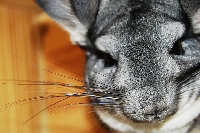
It takes dedication and attention to properly care for a chinchilla pet
Chinchillas are cute, cuddly creatures that make great pets, for the right person. They do, however, require a lot of care and have very specific needs, so it is best to thoroughly research these fuzzy rodents before committing to one.
Consider Your Chinchilla’s Safety
Chins (as they are commonly known by their fans) have very delicate bone structures, and are therefore not suitable pets for small children who like to squeeze tight.
They are also very prone to overheating. They have extremely dense fur–the densest of any known land mammal on earth–and must be kept in an air conditioned space, preferably around 65 degrees Fahrenheit, but never any warmer than 75. If a chinchilla overheats and its temperature is not brought down quickly, it will die.
The Boredom Factor
Another thing to consider at the outset is that Chinchillas are nocturnal, highly intelligent, and very curious. They will get bored and listless if they have nothing to do and no one to play with (much like toddlers).
~
If you have only one chinchilla, you will need to be prepared to spend ample time in the evening playing with your furry friend to keep him socialized and amiable, and you?ll need a safe place to let him run around outside his cage for exercise. These creatures are not ones you can put away in a cage, and leave them to admire at your leisure. They will interact with you, they will know you, and they will need you.
If you want a companion, get a chinchilla. If you want a goldfish, get a goldfish.
Room and Board
If you feel you?re up to the challenge of living with a chinchilla, let?s move on to housing and feeding. Your chinchilla?s cage should be at least 10 cubic feet for one chin, and an additional 5 cubic feet per each additional chin sharing the same cage. The bigger the cage the better, as chinchillas are not sedentary creatures and need room to run, play, and jump. Their cage must also have good air circulation. A wire cage, or even a partially wire cage is suitable, but be sure the spacing in the mesh is no more than ®? x ®? to ensure your pet doesn?t get her feet stuck or twisted in the wire.
You will need bedding to catch your chin?s waste, and it must be cleaned at least weekly. By nature, chinchillas are very clean animals. Their cage will not smell if properly maintained. The bedding material should be made of kiln dried pine (as opposed to regular pine), aspen, or Carefresh. Never use cedar or regular pine bedding, as these can cause respiratory problems in rodents and lead to death.
Chinchillas eat a very specific diet of chinchilla pellets and timothy hay or some other grass hay. Most pellets are made with alfalfa, and therefore you should avoid feeding your chinchilla alfalfa hay because too much of the stuff can cause health problems. Also, keep the treats to a minimum. Too many treats can make your furry friend sick.
And, as with most pets, you will need to provide a constant supply of clean, filtered water to drink. Water bottles are recommended for this purpose, as the water stays cleaner and is easily accessible.
Because chinchilla?s teeth grow constantly–it?s a rodent thing–they need an ample supply of toys on which to gnaw. They will chew on anything, so be careful to watch what they?re getting into and not let your chinchilla chew on plastic, which may get stuck in her throat, or rope, or anything else you don?t want utterly destroyed. Wood blocks, bits of cardboard, and wooden bird toys are good options.
Dust Baths
Chinchillas have an interesting little habit of dust-bathing, which they do to keep their fur clean and healthy.
They cannot be bathed in water (except in extreme circumstances), so you must provide a dust bath for your chinchillas at least twice a week–although daily is acceptable, if your chin doesn?t develop dry skin.
A dust bath consists of a container large and deep enough for the chinchilla to fit his whole body inside, with enough dust in which to roll around. Dust baths are part of the fun of owning a chinchilla, and it?s well worth sticking around to watch them wiggle and shimmy in their gray powder to get themselves clean. Chinchilla dust can be purchased at most major pet stores and is typically made of fine volcanic ash.
